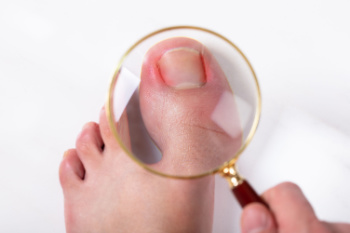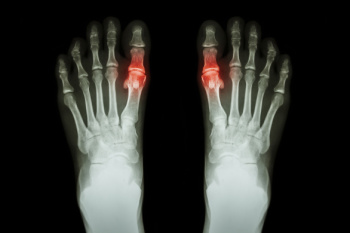Items filtered by date: August 2025
Treatment Options for Ingrown Toenails

Ingrown toenails can range from mildly uncomfortable to severely painful and infected. For more advanced cases, a podiatrist may lift and trim the ingrown portion of the nail or perform a partial nail removal to relieve pressure and allow proper healing. If the problem is recurrent, a procedure can be done to remove part of the nail root using a chemical or laser to prevent regrowth in that area. In cases of severe infection or persistent ingrowth, full nail removal may be recommended. These treatments aim to reduce pain, prevent infection, and correct nail growth. If left untreated, an ingrown toenail can lead to deeper infection and more serious complications. If you have a persistent ingrown toenail, it is suggested that you see a podiatrist for a diagnosis and treatment that best suits your condition.
Ingrown toenails may initially present themselves as a minor discomfort, but they may progress into an infection in the skin without proper treatment. For more information about ingrown toenails, contact one of our doctors of Conroe Foot Specialists. Our doctors can provide the care you need to keep you pain-free and on your feet.
Ingrown Toenails
Ingrown toenails are caused when the corner or side of a toenail grows into the soft flesh surrounding it. They often result in redness, swelling, pain, and in some cases, infection. This condition typically affects the big toe and may recur if it is not treated properly.
Causes
- Improper toenail trimming
- Genetics
- Improper shoe fitting
- Injury from pedicures or nail picking
- Abnormal gait
- Poor hygiene
You are more likely to develop an ingrown toenail if you are obese, have diabetes, arthritis, or have any fungal infection in your nails. Additionally, people who have foot or toe deformities are at a higher risk of developing an ingrown toenail.
Symptoms
Some symptoms of ingrown toenails are redness, swelling, and pain. In rare cases, there may be a yellowish drainage coming from the nail.
Treatment
Ignoring an ingrown toenail can have serious complications. Infections of the nail border can progress to a deeper soft-tissue infection, which can then turn into a bone infection. You should always speak with your podiatrist if you suspect you have an ingrown toenail, especially if you have diabetes or poor circulation.
If you have any questions, please feel free to contact our offices located in Conroe and Huntsville, TX . We offer the newest diagnostic and treatment technologies for all your foot care needs.
Gout and Managing It Effectively

Gout is a form of inflammatory arthritis caused by a buildup of uric acid in the bloodstream, leading to the formation of sharp crystals in the joints. It most often affects the big toe, causing sudden and intense pain, redness, swelling, and warmth. Risk factors include genetics, obesity, an overabundance of uric acid, and certain medical conditions. High levels of uric acid can result from diet, poor kidney function, or lifestyle habits. A podiatrist can help diagnose gout, manage painful flare-ups, and recommend changes to reduce recurrence. Gout can be extremely painful and may cause difficulty in completing daily activities. If you have sudden pain in your big toe, it is strongly suggested that you seek the care of a podiatrist who can help you manage this uncomfortable condition.
Gout is a foot condition that requires certain treatment and care. If you are seeking treatment, contact one of our doctors from Conroe Foot Specialists. Our doctors will treat your foot and ankle needs.
What Is Gout?
Gout is a type of arthritis caused by a buildup of uric acid in the bloodstream. It often develops in the foot, especially the big toe area, although it can manifest in other parts of the body as well. Gout can make walking and standing very painful and is especially common in diabetics and the obese.
People typically get gout because of a poor diet. Genetic predisposition is also a factor. The children of parents who have had gout frequently have a chance of developing it themselves.
Gout can easily be identified by redness and inflammation of the big toe and the surrounding areas of the foot. Other symptoms include extreme fatigue, joint pain, and running high fevers. Sometimes corticosteroid drugs can be prescribed to treat gout, but the best way to combat this disease is to get more exercise and eat a better diet.
If you have any questions, please feel free to contact our offices located in Conroe and Huntsville, TX . We offer the newest diagnostic and treatment technologies for all your foot care needs.
Ankle Fracture? Don’t Wait for Treatment
Causes and Symptoms of Peripheral Neuropathy in the Feet

Peripheral neuropathy in the feet occurs when nerve damage leads to impaired communication between the brain and the lower extremities. This condition can be caused by diabetes, infections, vitamin deficiencies, autoimmune disorders, or exposure to toxins. Risk factors include uncontrolled blood sugar, excessive alcohol use, and certain medical treatments. Symptoms include numbness, tingling, burning sensations, sharp pain, or loss of balance, which can increase the risk of falls and injuries. A podiatrist can help by performing a thorough evaluation, recommending protective footwear, and providing foot care guidance. If you experience persistent numbness or pain in your feet, it is suggested that you are under the care of a podiatrist who can help you to manage this condition.
Neuropathy
Neuropathy can be a potentially serious condition, especially if it is left undiagnosed. If you have any concerns that you may be experiencing nerve loss in your feet, consult with one of our doctors from Conroe Foot Specialists. Our doctors will assess your condition and provide you with quality foot and ankle treatment for neuropathy.
What Is Neuropathy?
Neuropathy is a condition that leads to damage to the nerves in the body. Peripheral neuropathy, or neuropathy that affects your peripheral nervous system, usually occurs in the feet. Neuropathy can be triggered by a number of different causes. Such causes include diabetes, infections, cancers, disorders, and toxic substances.
Symptoms of Neuropathy Include:
- Numbness
- Sensation loss
- Prickling and tingling sensations
- Throbbing, freezing, burning pains
- Muscle weakness
Those with diabetes are at serious risk due to being unable to feel an ulcer on their feet. Diabetics usually also suffer from poor blood circulation. This can lead to the wound not healing, infections occurring, and the limb may have to be amputated.
Treatment
To treat neuropathy in the foot, podiatrists will first diagnose the cause of the neuropathy. Figuring out the underlying cause of the neuropathy will allow the podiatrist to prescribe the best treatment, whether it be caused by diabetes, toxic substance exposure, infection, etc. If the nerve has not died, then it’s possible that sensation may be able to return to the foot.
Pain medication may be issued for pain. Electrical nerve stimulation can be used to stimulate nerves. If the neuropathy is caused from pressure on the nerves, then surgery may be necessary.
If you have any questions, please feel free to contact our offices located in Conroe and Huntsville, TX . We offer the newest diagnostic and treatment technologies for all your foot care needs.
Importance of Foot Care in Diabetic Patients

Diabetes can have a serious impact on foot health due to its effects on nerves and circulation. Damage to the nerves, known as peripheral neuropathy, can reduce feeling in the feet, making it harder to notice injuries like blisters, sores, or pressure points. Poor blood flow caused by narrowed arteries may delay healing and increase the risk of infections. These problems can lead to serious complications, including ulcers, deformities, spontaneous fractures, infections, and, in severe cases, limb loss. A podiatrist can help identify early signs of diabetic foot problems and provide medical care to reduce complications. This may involve careful removal of damaged tissue, pressure relief techniques, or wound care to promote healing. Ongoing medical care helps prevent problems from worsening and protects against serious outcomes. If you have foot problems related to diabetes, it is suggested that you schedule regular visits to a podiatrist for an exam and ongoing treatment.
Diabetic foot care is important in preventing foot ailments such as ulcers. If you are suffering from diabetes or have any other concerns about your feet, contact one of our doctors from Conroe Foot Specialists. Our doctors can provide the care you need to keep you pain-free and on your feet.
Diabetic Foot Care
Diabetes affects millions of people every year. The condition can damage blood vessels in many parts of the body, especially the feet. Because of this, taking care of your feet is essential if you have diabetes, and having a podiatrist help monitor your foot health is highly recommended.
The Importance of Caring for Your Feet
- Routinely inspect your feet for bruises or sores.
- Wear socks that fit your feet comfortably.
- Wear comfortable shoes that provide adequate support.
Patients with diabetes should have their doctor monitor their blood levels, as blood sugar levels play such a huge role in diabetic care. Monitoring these levels on a regular basis is highly advised.
It is always best to inform your healthcare professional of any concerns you may have regarding your feet, especially for diabetic patients. Early treatment and routine foot examinations are keys to maintaining proper health, especially because severe complications can arise if proper treatment is not applied.
If you have any questions, please feel free to contact our offices located in Conroe and Huntsville, TX . We offer the newest diagnostic and treatment technologies for all your foot care needs.

